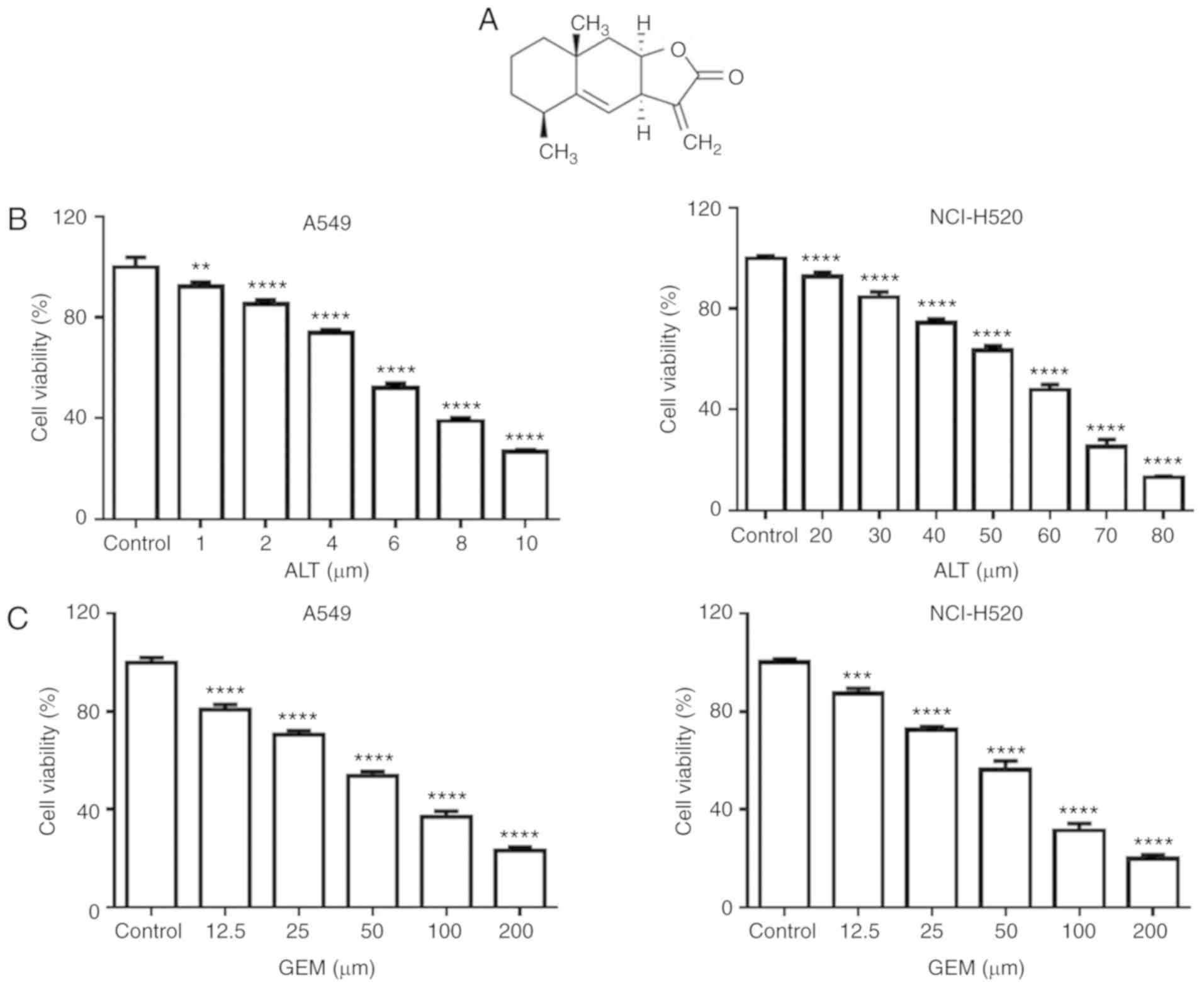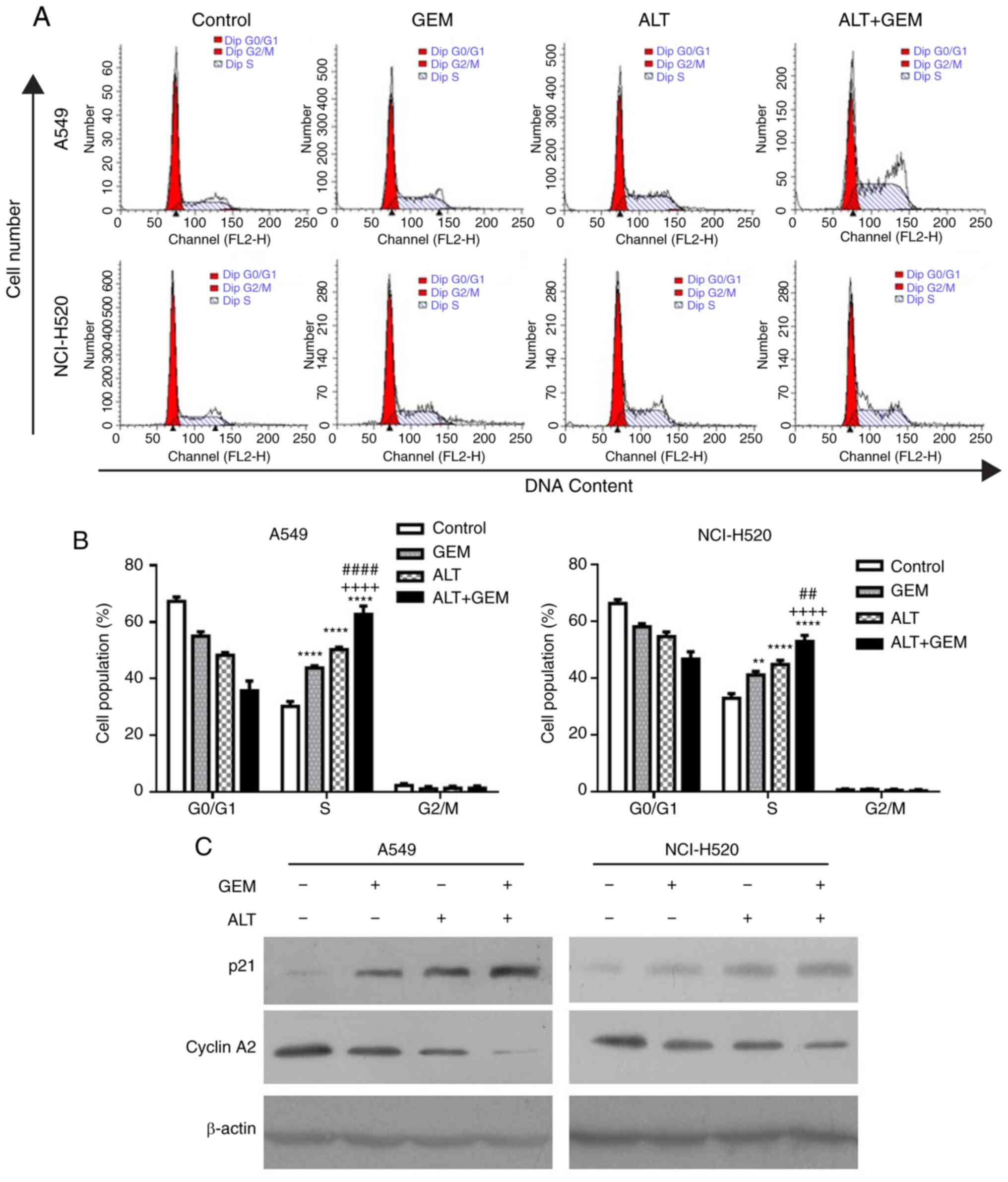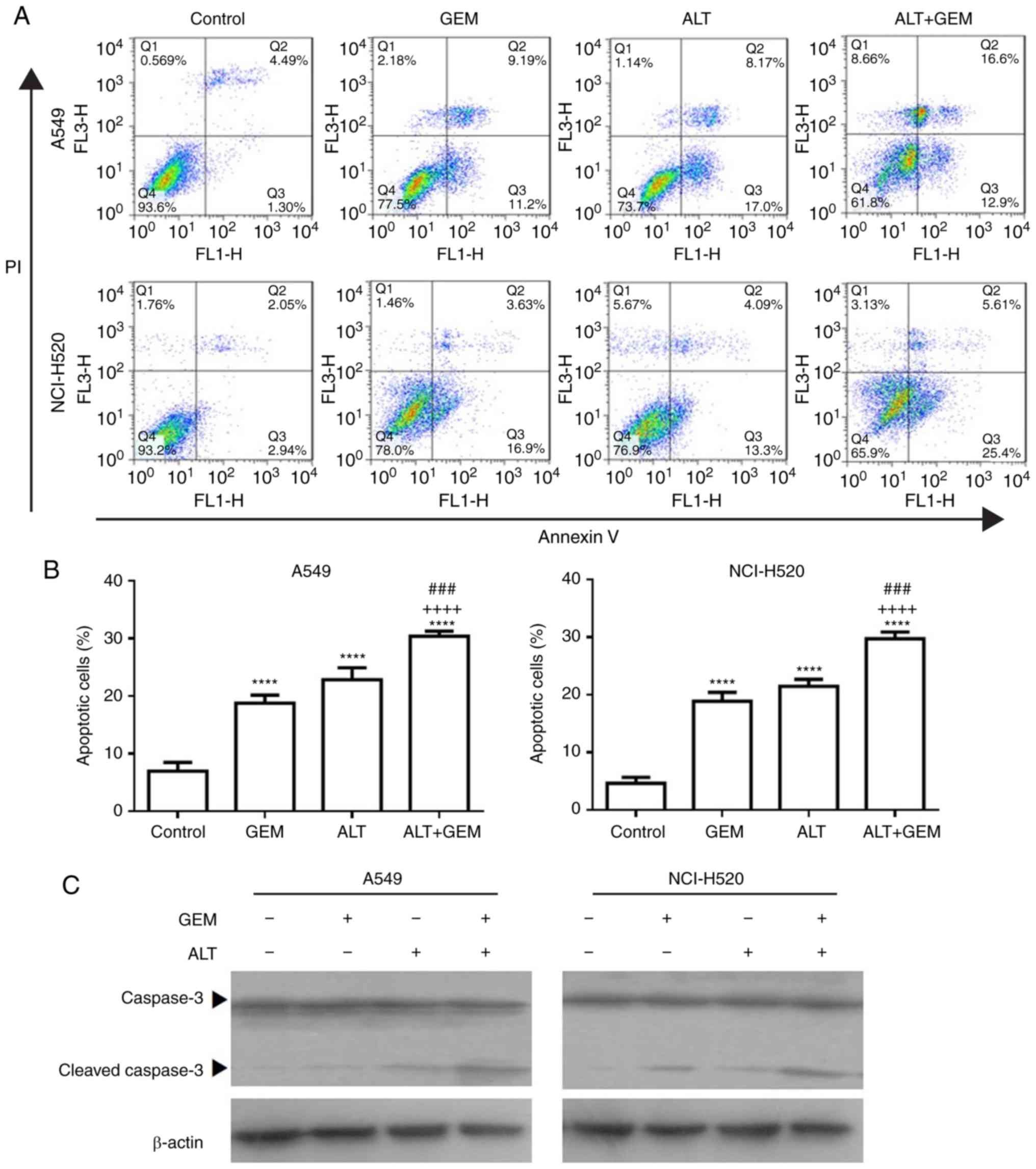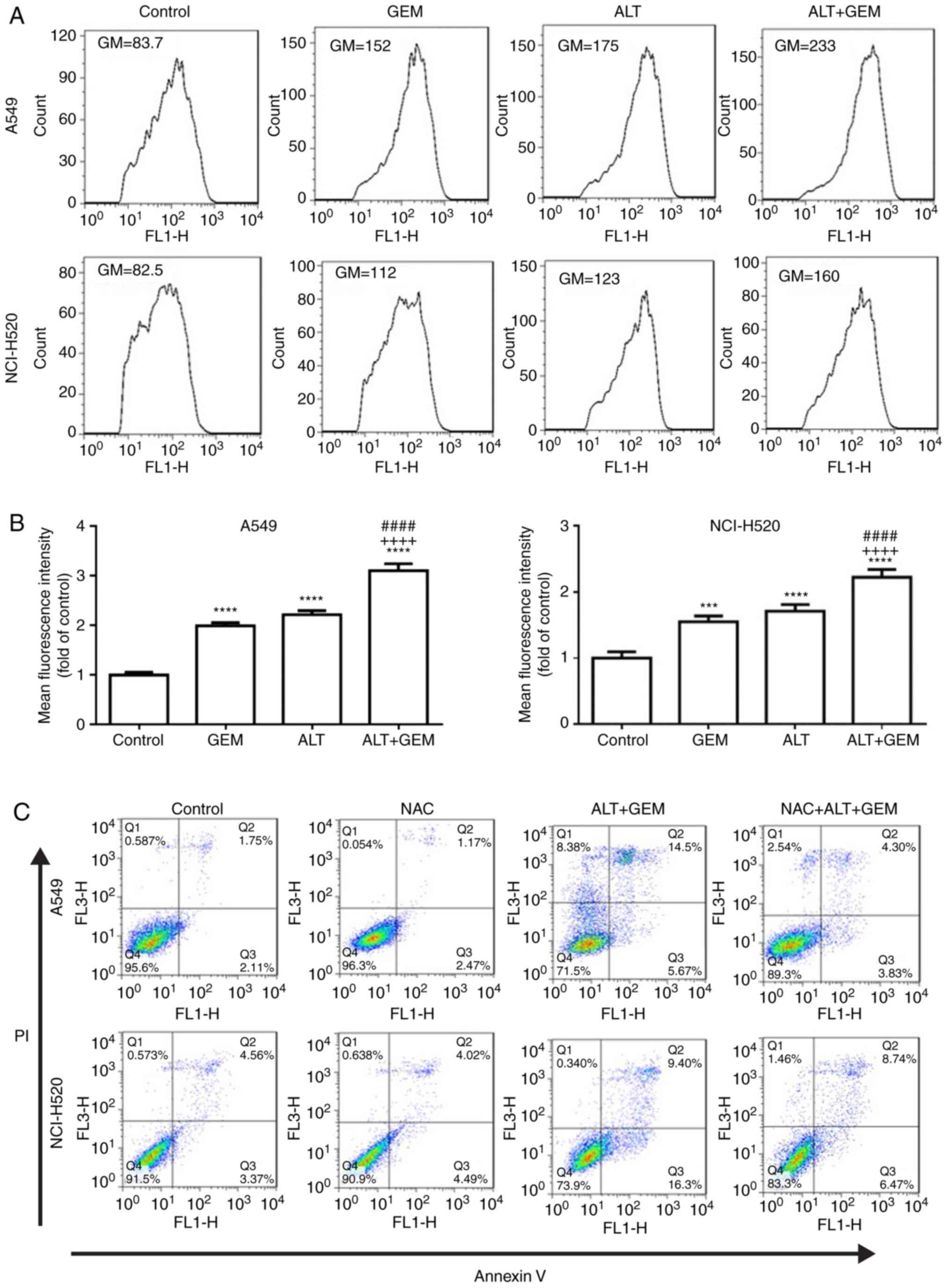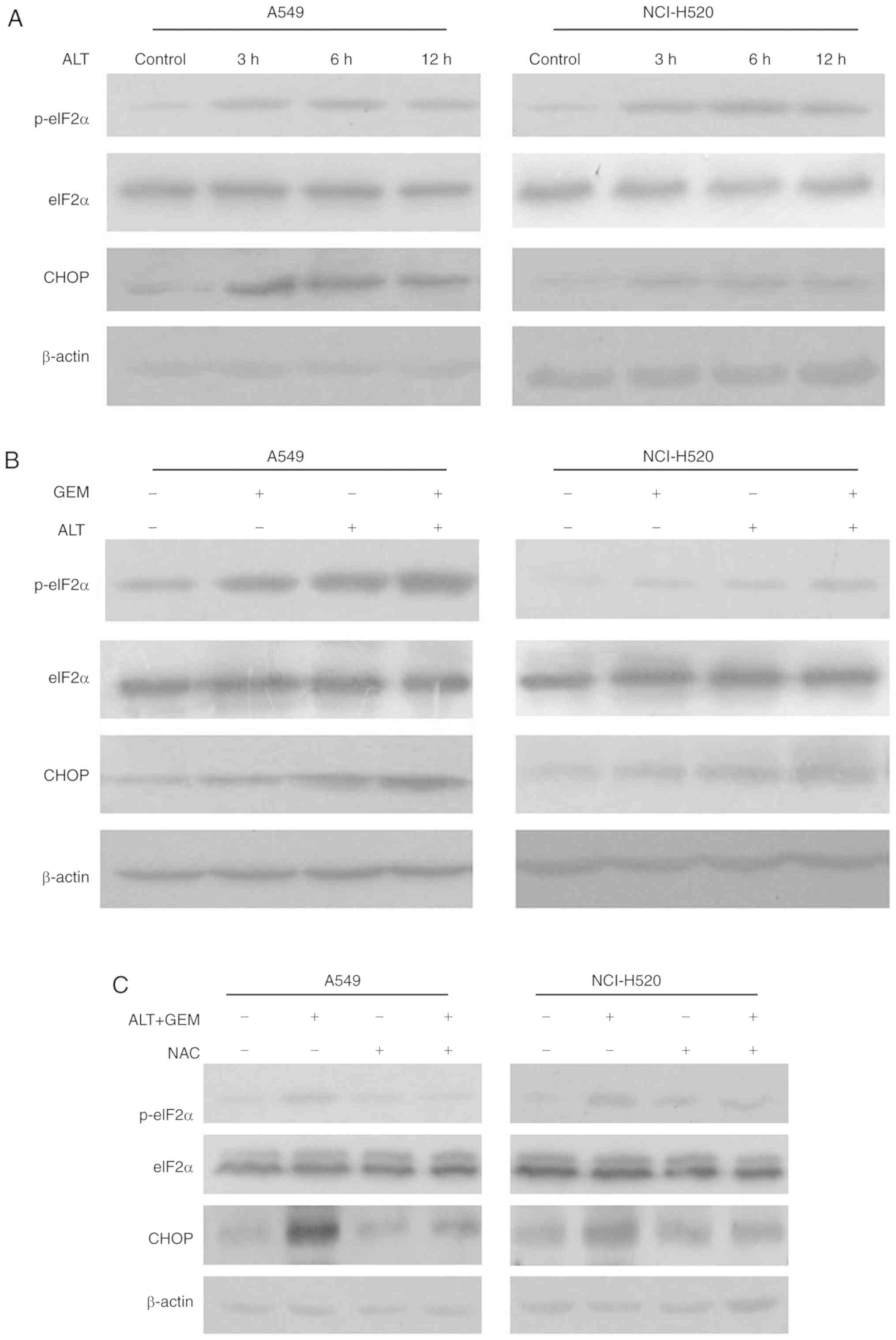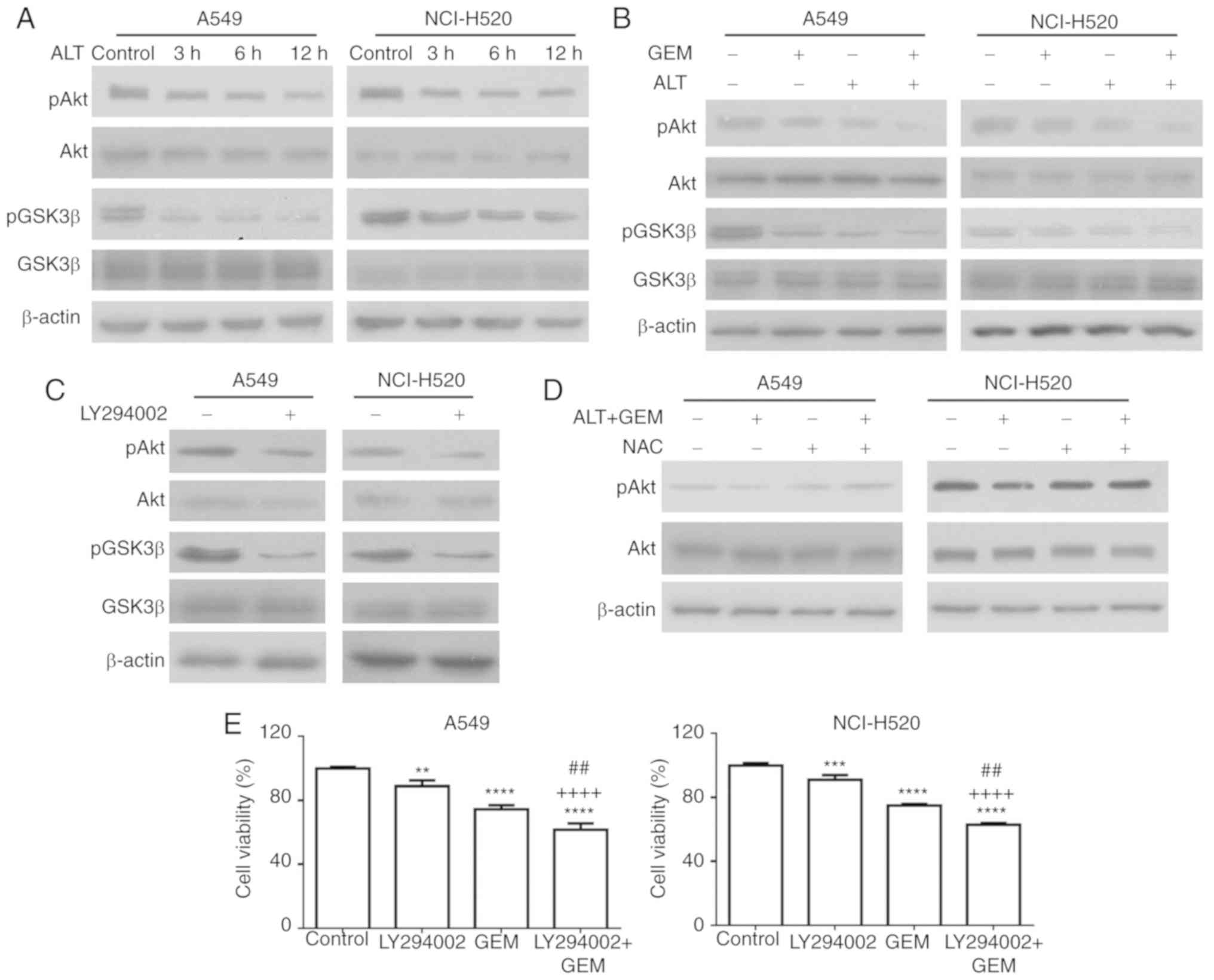|
1
|
Molina JR, Yang P, Cassivi SD, Schild SE
and Adjei AA: Non-small cell lung cancer: Epidemiology, risk
factors, treatment, and survivorship. Mayo Clin Proc. 83:584–594.
2008. View Article : Google Scholar : PubMed/NCBI
|
|
2
|
Feldman MW and Roughgarden J: A
population's stationary distribution and chance of extinction in a
stochastic environment with remarks on the theory of species
packing. Theor Popul Biol. 7:197–207. 1975. View Article : Google Scholar : PubMed/NCBI
|
|
3
|
Siegel RL, Miller KD and Jemal A: Cancer
statistics, 2018. CA Cancer J Clin. 68:7–30. 2018. View Article : Google Scholar : PubMed/NCBI
|
|
4
|
Carvajal-Hausdorf D, Altan M, Velcheti V,
Gettinger SN, Herbst RS, Rimm DL and Schalper KA: Expression and
clinical significance of PD-L1, B7-H3, B7-H4 and TILs in human
small cell lung Cancer (SCLC). J Immunother Cancer. 7:652019.
View Article : Google Scholar : PubMed/NCBI
|
|
5
|
Torre LA, Siegel RL and Jemal A: Lung
cancer statistics. Adv Exp Med Biol. 893:1–19. 2016. View Article : Google Scholar
|
|
6
|
Lee SH: Chemotherapy for lung cancer in
the era of personalized medicine. Tuberc Respir Dis (Seoul). Dec
20–2018, Epub ahead of print.
|
|
7
|
Jia Y and Xie J: Promising molecular
mechanisms responsible for gemcitabine resistance in cancer. Genes
Dis. 2:299–306. 2015. View Article : Google Scholar : PubMed/NCBI
|
|
8
|
Qin JJ, Li X, Hunt C, Wang W, Wang H and
Zhang R: Natural products targeting the p53-MDM-2 pathway and
mutant p53: Recent advances and implications in cancer medicine.
Genes Dis. 5:204–219. 2018. View Article : Google Scholar : PubMed/NCBI
|
|
9
|
Albuquerque KRS, Pacheco NM, Del Rosario
Loyo Casao T, de Melo FCSA, Novaes RD and Goncalves RV:
Applicability of plant extracts in preclinical studies of melanoma:
A systematic review. Mediators Inflamm. 2018:67979242018.
View Article : Google Scholar : PubMed/NCBI
|
|
10
|
Kim C and Kim B: Anti-cancer natural
products and their bioactive compounds inducing ER stress-mediated
apoptosis: A review. Nutrients. 10:E10212018. View Article : Google Scholar : PubMed/NCBI
|
|
11
|
Demain AL and Vaishnav P: Natural products
for cancer chemotherapy. Microb Biotechnol. 4:687–699. 2011.
View Article : Google Scholar : PubMed/NCBI
|
|
12
|
Meng LQ, Wang Y, Luo YH, Piao XJ, Liu C,
Wang Y, Zhang Y, Wang JR, Wang H, Xu WT, et al: Quinalizarin
induces apoptosis through reactive oxygen species (ROS)-mediated
mitogen-activated protein kinase (MAPK) and signal transducer and
activator of transcription 3 (STAT3) signaling pathways in
colorectal cancer cells. Med Sci Monit. 24:3710–3719. 2018.
View Article : Google Scholar : PubMed/NCBI
|
|
13
|
Liu F, Gao S, Yang Y, Zhao X, Fan Y, Ma W,
Yang D, Yang A and Yu Y: Antitumor activity of curcumin by
modulation of apoptosis and autophagy in human lung cancer A549
cells through inhibiting PI3K/Akt/mTOR pathway. Oncol Rep.
39:1523–1531. 2018.PubMed/NCBI
|
|
14
|
Huang H, Xie H, Pan Y, Zheng K, Xia Y and
Chen W: Plumbagin triggers ER stress-mediated apoptosis in prostate
cancer cells via induction of ROS. Cell Physiol Biochem.
45:267–280. 2018. View Article : Google Scholar : PubMed/NCBI
|
|
15
|
Wang Y, Wang S, Liu J, Lu Y and Li D:
Licoricidin enhances gemcitabine-induced cytotoxicity in
osteosarcoma cells by suppressing the Akt and NF-kappaB signal
pathways. Chem Biol Interact. 290:44–51. 2018. View Article : Google Scholar : PubMed/NCBI
|
|
16
|
Cheng L, Yan B, Chen K, Jiang Z, Zhou C,
Cao J, Qian W, Li J, Sun L, Ma J, et al: Resveratrol-induced
downregulation of NAF-1 enhances the sensitivity of pancreatic
cancer cells to gemcitabine via the ROS/Nrf2 signaling pathways.
Oxid Med Cell Longev. 2018:94820182018. View Article : Google Scholar : PubMed/NCBI
|
|
17
|
Ding Y, Wang H, Niu J, Luo M, Gou Y, Miao
L, Zou Z and Cheng Y: Induction of ROS overload by alantolactone
prompts oxidative DNA damage and apoptosis in colorectal cancer
cells. Int J Mol Sci. 17:5582016. View Article : Google Scholar : PubMed/NCBI
|
|
18
|
Jiang Y, Xu H and Wang J: Alantolactone
induces apoptosis of human cervical cancer cells via reactive
oxygen species generation, glutathione depletion and inhibition of
the Bcl-2/Bax signaling pathway. Oncol Lett. 11:4203–4207. 2016.
View Article : Google Scholar : PubMed/NCBI
|
|
19
|
Cui L, Bu W, Song J, Feng L, Xu T, Liu D,
Ding W, Wang J, Li C, Ma B, et al: Apoptosis induction by
alantolactone in breast cancer MDA-MB-231 cells through reactive
oxygen species-mediated mitochondrion-dependent pathway. Arch Pharm
Res. 41:299–313. 2018. View Article : Google Scholar
|
|
20
|
Zhao P, Pan Z, Luo Y, Zhang L, Li X, Zhang
G, Zhang Y, Cui R, Sun M and Zhang X: Alantolactone induces
apoptosis and cell cycle arrest on lung squamous cancer SK-MES-1
cells. J Biochem Mol Toxicol. 29:199–206. 2015. View Article : Google Scholar : PubMed/NCBI
|
|
21
|
Maryam A, Mehmood T, Zhang H, Li Y, Khan M
and Ma T: Alantolactone induces apoptosis, promotes STAT3
glutathionylation and enhances chemosensitivity of A549 lung
adenocarcinoma cells to doxorubicin via oxidative stress. Sci Rep.
7:62422017. View Article : Google Scholar : PubMed/NCBI
|
|
22
|
Zhang Y, Wang J, Hui B, Sun W, Li B, Shi
F, Che S, Chai L and Song L: Pristimerin enhances the effect of
cisplatin by inhibiting the miR23a/Akt/GSK3beta signaling pathway
and suppressing autophagy in lung cancer cells. Int J Mol Med.
43:1382–1394. 2019.PubMed/NCBI
|
|
23
|
Razak NA, Abu N, Ho WY, Zamberi NR, Tan
SW, Alitheen NB, Long K and Yeap SK: Cytotoxicity of eupatorin in
MCF-7 and MDA-MB-231 human breast cancer cells via cell cycle
arrest, anti-angiogenesis and induction of apoptosis. Sci Rep.
9:15142019. View Article : Google Scholar : PubMed/NCBI
|
|
24
|
Yang X, Zhao L, Zhang T, Xi J, Liu S, Ren
L, Zheng Y and Zhang H: Protosappanin B promotes apoptosis and
causes G1 cell cycle arrest in human bladder cancer cells. Sci Rep.
9:10482019. View Article : Google Scholar :
|
|
25
|
Geng YD, Zhang L, Wang GY, Feng XJ, Chen
ZL, Jiang L and Shen AZ: Xanthatin mediates G2/M cell cycle arrest,
autophagy and apoptosis via ROS/XIAP signaling in human colon
cancer cells. Nat Prod Res. 1–5. 2018.Epub ahead of print.
View Article : Google Scholar
|
|
26
|
Zhou GZ, Li AF, Sun YH and Sun GC: A novel
synthetic curcumin derivative MHMM-41 induces ROS-mediated
apoptosis and migration blocking of human lung cancer cells A549.
Biomed Pharmacother. 103:391–398. 2018. View Article : Google Scholar : PubMed/NCBI
|
|
27
|
Ma G, Luo W, Lu J, Ma DL, Leung CH, Wang Y
and Chen X: Cucurbitacin E induces caspase-dependent apoptosis and
protective autophagy mediated by ROS in lung cancer cells. Chem
Biol Interact. 253:1–9. 2016. View Article : Google Scholar : PubMed/NCBI
|
|
28
|
Chen W, Li P, Liu Y, Yang Y, Ye X, Zhang F
and Huang H: Isoalantolactone induces apoptosis through
ROS-mediated ER stress and inhibition of STAT3 in prostate cancer
cells. J Exp Clin Cancer Res. 37:3092018. View Article : Google Scholar : PubMed/NCBI
|
|
29
|
Xu Y, Tong Y, Ying J, Lei Z, Wan L, Zhu X,
Ye F, Mao P, Wu X, Pan R, et al: Chrysin induces cell growth
arrest, apoptosis, and ER stress and inhibits the activation of
STAT3 through the generation of ROS in bladder cancer cells. Oncol
Lett. 15:9117–9125. 2018.PubMed/NCBI
|
|
30
|
Ge G, Yan Y and Cai H: Ginsenoside Rh2
inhibited proliferation by inducing ROS mediated ER stress
dependent apoptosis in lung cancer cells. Biol Pharm Bull.
40:2117–2124. 2017. View Article : Google Scholar : PubMed/NCBI
|
|
31
|
Ji L, Zhong B, Jiang X, Mao F, Liu G, Song
B, Wang CY, Jiao Y, Wang JP, Xu ZB, et al: Actein induces autophagy
and apoptosis in human bladder cancer by potentiating ROS/JNK and
inhibiting AKT pathways. Oncotarget. 8:112498–112515. 2017.
View Article : Google Scholar
|
|
32
|
Ahn KI, Choi EO, Kwon DH, HwangBo H, Kim
MY, Kim HJ, Ji SY, Hong SH, Jeong JW, Park C, et al: Induction of
apoptosis by ethanol extract of Citrus unshiu Markovich peel in
human bladder cancer T24 cells through ROS-mediated inactivation of
the PI3K/Akt pathway. Biosci Trends. 11:565–573. 2017. View Article : Google Scholar : PubMed/NCBI
|
|
33
|
Lai ZQ, Ip SP, Liao HJ, Lu Z, Xie JH, Su
ZR, Chen YL, Xian YF, Leung PS and Lin ZX: Brucein D, a naturally
occurring tetracyclic triterpene quassinoid, induces apoptosis in
pancreatic cancer through ROS-associated PI3K/Akt signaling
pathway. Front Pharmacol. 8:9362017. View Article : Google Scholar
|
|
34
|
Guo CL, Wang LJ, Zhao Y, Liu H, Li XQ,
Jiang B, Luo J, Guo SJ, Wu N and Shi DY: A novel bromophenol
derivative BOS-102 induces cell cycle arrest and Apoptosis in human
A549 lung cancer cells via ROS-Mediated PI3K/Akt and the MAPK
signaling pathway. Mar Drugs. 16:E432018. View Article : Google Scholar : PubMed/NCBI
|
|
35
|
Amrutkar M and Gladhaug IP: Pancreatic
cancer chemoresistance to gemcitabine. Cancers (Basel). 9:E1572017.
View Article : Google Scholar
|
|
36
|
Li Y, Wang LR, Chen J, Lou Y and Zhang GB:
First-line gemcitabine plus cisplatin in nonsmall cell lung cancer
patients. Dis Markers. 2014:9604582014. View Article : Google Scholar : PubMed/NCBI
|
|
37
|
Xu B and Tao ZZ: Piceatannol enhances the
antitumor efficacy of gemcitabine in human A549 non-small cell lung
cancer cells. Oncol Res. 22:213–217. 2014. View Article : Google Scholar
|
|
38
|
Gebregiworgis T, Bhinderwala F, Purohit V,
Chaika NV, Singh PK and Powers R: Insights into gemcitabine
resistance and the potential for therapeutic monitoring.
Metabolomics. 14:1562018. View Article : Google Scholar
|
|
39
|
Yao Y, Xia D, Bian Y, Sun Y, Zhu F, Pan B,
Niu M, Zhao K, Wu Q, Qiao J, et al: Alantolactone induces G-1 phase
arrest and apoptosis of multiple myeloma cells and overcomes
bortezomib resistance. Apoptosis. 20:1122–1133. 2015. View Article : Google Scholar : PubMed/NCBI
|
|
40
|
Wang Y, Ji P, Liu J, Broaddus RR, Xue F
and Zhang W: Centrosome-associated regulators of the G(2)/M
checkpoint as targets for cancer therapy. Mol Cancer. 8:82009.
View Article : Google Scholar : PubMed/NCBI
|
|
41
|
Liu Y, Kang X, Niu G, He S, Zhang T, Bai
Y, Li Y, Hao H, Chen C, Shou Z and Li B: Shikonin induces apoptosis
and prosurvival autophagy in human melanoma A375 cells via
ROS-mediated ER stress and p38 pathways. Artif Cells Nanomed
Biotechnol. 47:626–635. 2019. View Article : Google Scholar : PubMed/NCBI
|
|
42
|
Li J, Pan YY and Zhang Y: Synergistic
interaction between sorafenib and gemcitabine in EGFR-TKI-sensitive
and EGFR-TKI-resistant human lung cancer cell lines. Oncol Lett.
5:440–446. 2013. View Article : Google Scholar : PubMed/NCBI
|
|
43
|
Li J, Wang S, Su ZF and Yuan Y:
Synergistic effects of sorafenib in combination with gemcitabine or
pemetrexed in lung cancer cell lines with K-ras mutations. Contemp
Oncol (Pozn). 20:33–38. 2016.
|
|
44
|
Tang Y, Wang Y and Teng X:
Sequence-dependent effect of gemcitabine and cisplatin on A549
non-small-cell lung cancer cells. Mol Med Rep. 8:221–226. 2013.
View Article : Google Scholar : PubMed/NCBI
|
|
45
|
Huang YF, Zhu DJ, Chen XW, Chen QK, Luo
ZT, Liu CC, Wang GX, Zhang WJ and Liao NZ: Curcumin enhances the
effects of irinotecan on colorectal cancer cells through the
generation of reactive oxygen species and activation of the
endoplasmic reticulum stress pathway. Oncotarget. 8:40264–40275.
2017.PubMed/NCBI
|
|
46
|
Broecker-Preuss M, Becher-Boveleth N,
Muller S and Mann K: The BH3 mimetic drug ABT-737 induces apoptosis
and acts synergistically with chemotherapeutic drugs in thyroid
carcinoma cells. Cancer Cell Int. 16:272016. View Article : Google Scholar : PubMed/NCBI
|
|
47
|
Gregoraszczuk EL, Rak-Mardyła A, Ryś J,
Jakubowicz J and Urbański K: Effect of chemotherapeutic drugs on
Caspase-3 activity, as a key biomarker for Apoptosis in ovarian
tumor cell cultured as monolayer. A Pilot Study Iran J Pharm Res.
14:1153–1161. 2015.
|
|
48
|
Teng JP, Yang ZY, Zhu YM, Ni D, Zhu ZJ and
Li XQ: Gemcitabine and cisplatin for treatment of lung cancer in
vitro and vivo. Eur Rev Med Pharmacol Sci. 22:3819–3825.
2018.PubMed/NCBI
|
|
49
|
Seervi M, Rani A, Sharma AK and Santhosh
Kumar TR: ROS mediated ER stress induces Bax-Bak dependent and
independent apoptosis in response to Thioridazine. Biomed
Pharmacother. 106:200–209. 2018. View Article : Google Scholar : PubMed/NCBI
|
|
50
|
Yadav RK, Chae SW, Kim HR and Chae HJ:
Endoplasmic reticulum stress and cancer. J Cancer Prev. 19:75–88.
2014. View Article : Google Scholar : PubMed/NCBI
|
|
51
|
Chipurupalli S, Kannan E, Tergaonkar V,
D'Andrea R and Robinson N: Hypoxia induced ER stress response as an
adaptive mechanism in cancer. Int J Mol Sci. 20:E7492019.
View Article : Google Scholar : PubMed/NCBI
|
|
52
|
Wang M and Kaufman RJ: The impact of the
endoplasmic reticulum protein-folding environment on cancer
development. Nat Rev Cancer. 14:581–597. 2014. View Article : Google Scholar : PubMed/NCBI
|
|
53
|
Logothetis C, Aparicio A and Thompson TC:
ER stress in prostate cancer: A therapeutically exploitable
vulnerability? Sci Transl Med. 10:pp. eaat39752018, View Article : Google Scholar : PubMed/NCBI
|
|
54
|
Wu S, Yang Y, Li F, Huang L, Han Z, Wang
G, Yu H and Li H: Chelerythrine induced cell death through
ROS-dependent ER stress in human prostate cancer cells. Onco
Targets Ther. 11:2593–2601. 2018. View Article : Google Scholar : PubMed/NCBI
|
|
55
|
Lin CL, Lee CH, Chen CM, Cheng CW, Chen
PN, Ying TH and Hsieh YH: Protodioscin induces Apoptosis through
ROS-Mediated endoplasmic reticulum stress via the JNK/p38
activation pathways in human cervical cancer cells. Cell Physiol
Biochem. 46:322–334. 2018. View Article : Google Scholar : PubMed/NCBI
|
|
56
|
Madhunapantula SV, Mosca PJ and Robertson
GP: The Akt signaling pathway: An emerging therapeutic target in
malignant melanoma. Cancer Biol Ther. 12:1032–1049. 2011.
View Article : Google Scholar : PubMed/NCBI
|
|
57
|
Hong SW, Shin JS, Moon JH, Kim YS, Lee J,
Choi EK, Ha SH, Lee DH, Chung HN, Kim JE, et al: NVP-BEZ235, a dual
PI3K/mTOR inhibitor, induces cell death through alternate routes in
prostate cancer cells depending on the PTEN genotype. Apoptosis.
19:895–904. 2014. View Article : Google Scholar : PubMed/NCBI
|
|
58
|
Liu M, Li CM, Chen ZF, Ji R, Guo QH, Li Q,
Zhang HL and Zhou YN: Celecoxib regulates apoptosis and autophagy
via the PI3K/Akt signaling pathway in SGC-7901 gastric cancer
cells. Int J Mol Med. 33:1451–1458. 2014. View Article : Google Scholar : PubMed/NCBI
|
|
59
|
Xue M, Ji X, Xue C, Liang H, Ge Y, He X
and Zhang L, Bian K and Zhang L: Caspase-dependent and
caspase-independent induction of apoptosis in breast cancer by
fucoidan via the PI3K/AKT/GSK3β pathway in vivo and in vitro.
Biomed Pharmacother. 94:898–908. 2017. View Article : Google Scholar : PubMed/NCBI
|
|
60
|
Yang Q, Wen L, Meng Z and Chen Y: Blockage
of endoplasmic reticulum stress attenuates nilotinib-induced
cardiotoxicity by inhibition of the Akt-GSK3β-Nox4 signaling. Eur J
Pharmacol. 822:85–94. 2018. View Article : Google Scholar : PubMed/NCBI
|
|
61
|
Song X, Wang Z, Liang H, Zhang W, Ye Y, Li
H, Hu Y, Zhang Y, Weng H, Lu J, et al: Dioscin induces gallbladder
cancer Apoptosis by inhibiting ROS-Mediated PI3K/AKT signalling.
Int J Biol Sci. 13:782–793. 2017. View Article : Google Scholar : PubMed/NCBI
|
|
62
|
Li Y, Huang X, Huang Z and Feng J:
Phenoxodiol enhances the antitumor activity of gemcitabine in
gallbladder cancer through suppressing Akt/mTOR pathway. Cell
Biochem Biophys. 70:1337–1342. 2014. View Article : Google Scholar : PubMed/NCBI
|
|
63
|
Tuya N, Wang Y, Tong L, Gao W, Yu R and
Xue L: Trichosanthin enhances the antitumor effect of gemcitabine
in non-small cell lung cancer via inhibition of the PI3K/AKT
pathway. Exp Ther Med. 14:5767–5772. 2017.PubMed/NCBI
|















